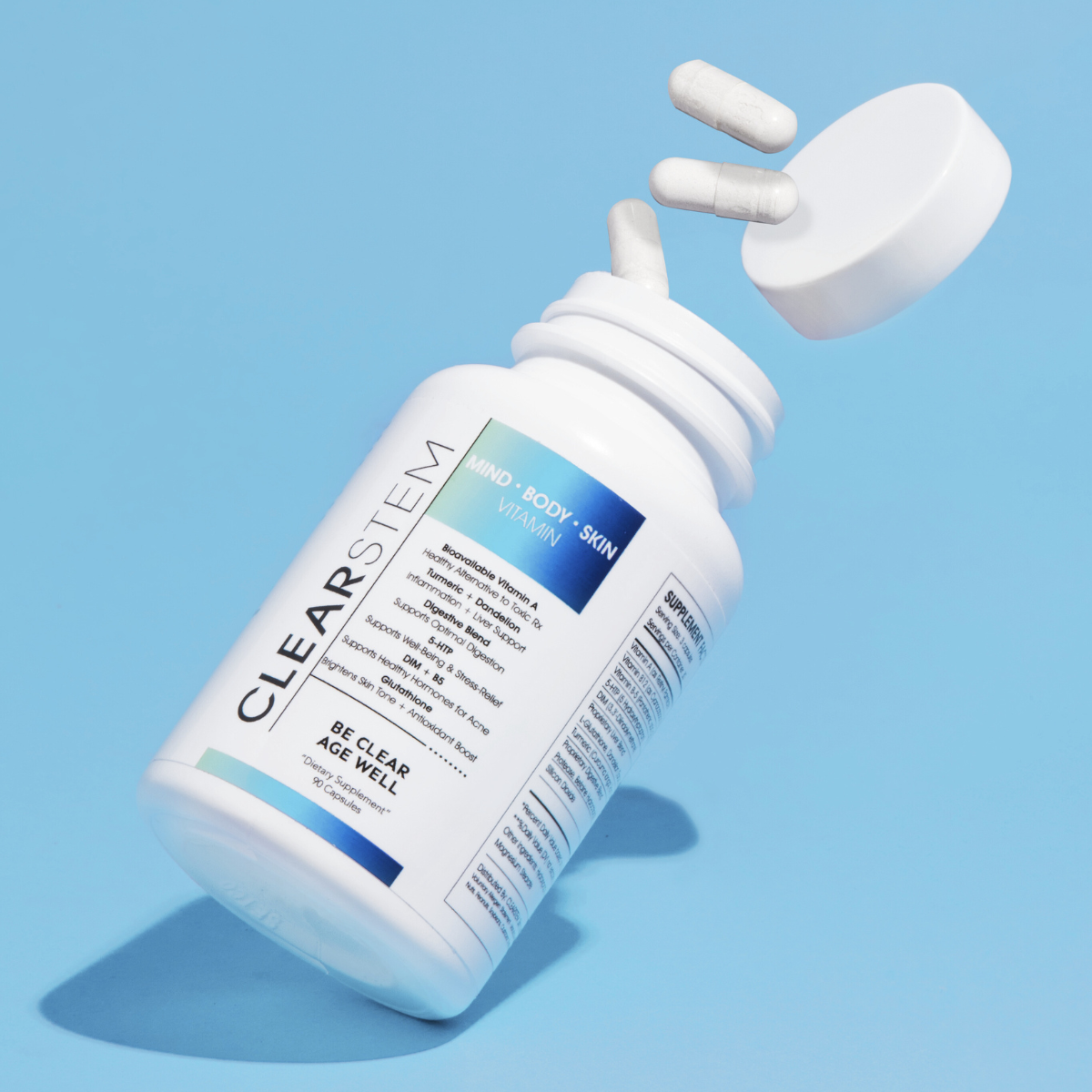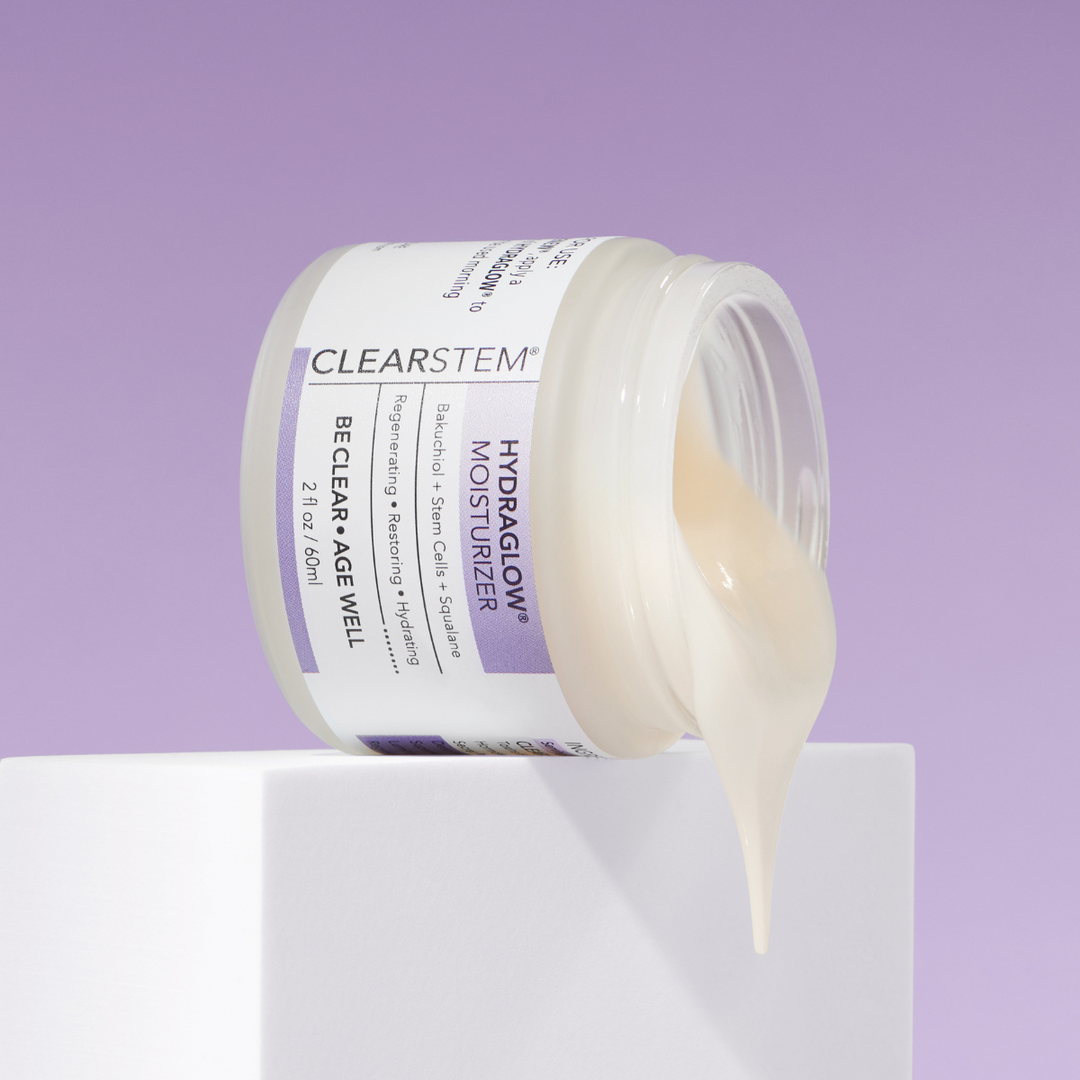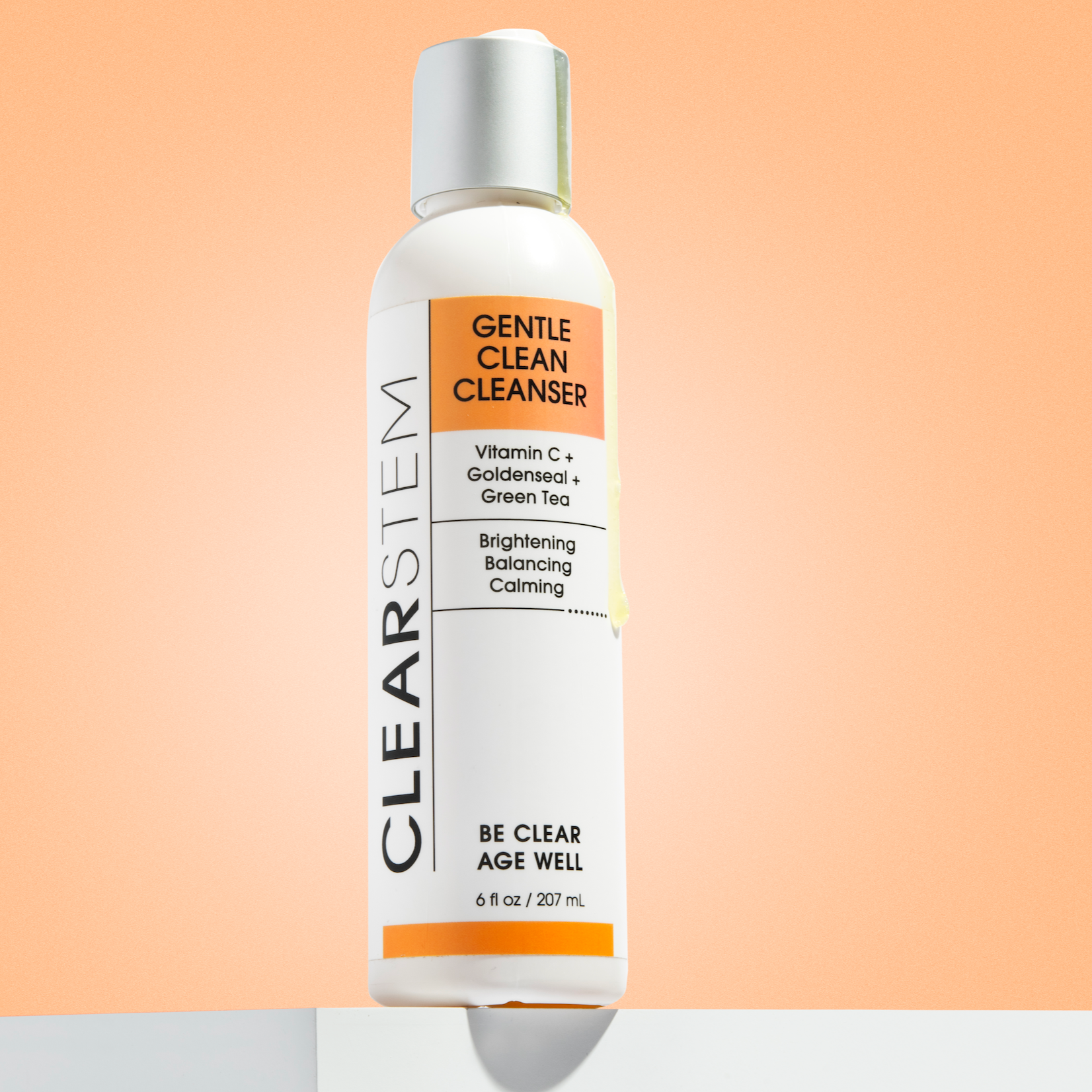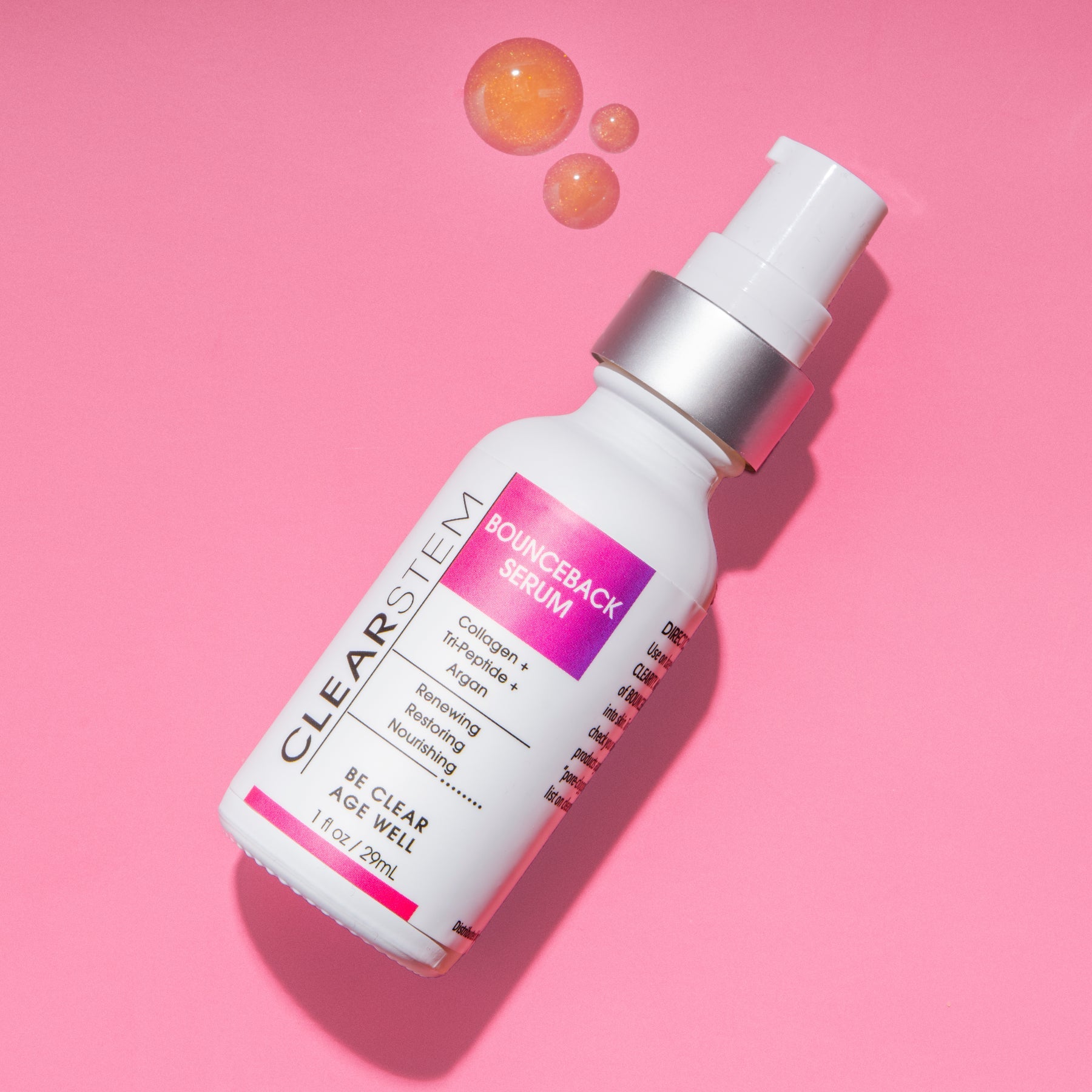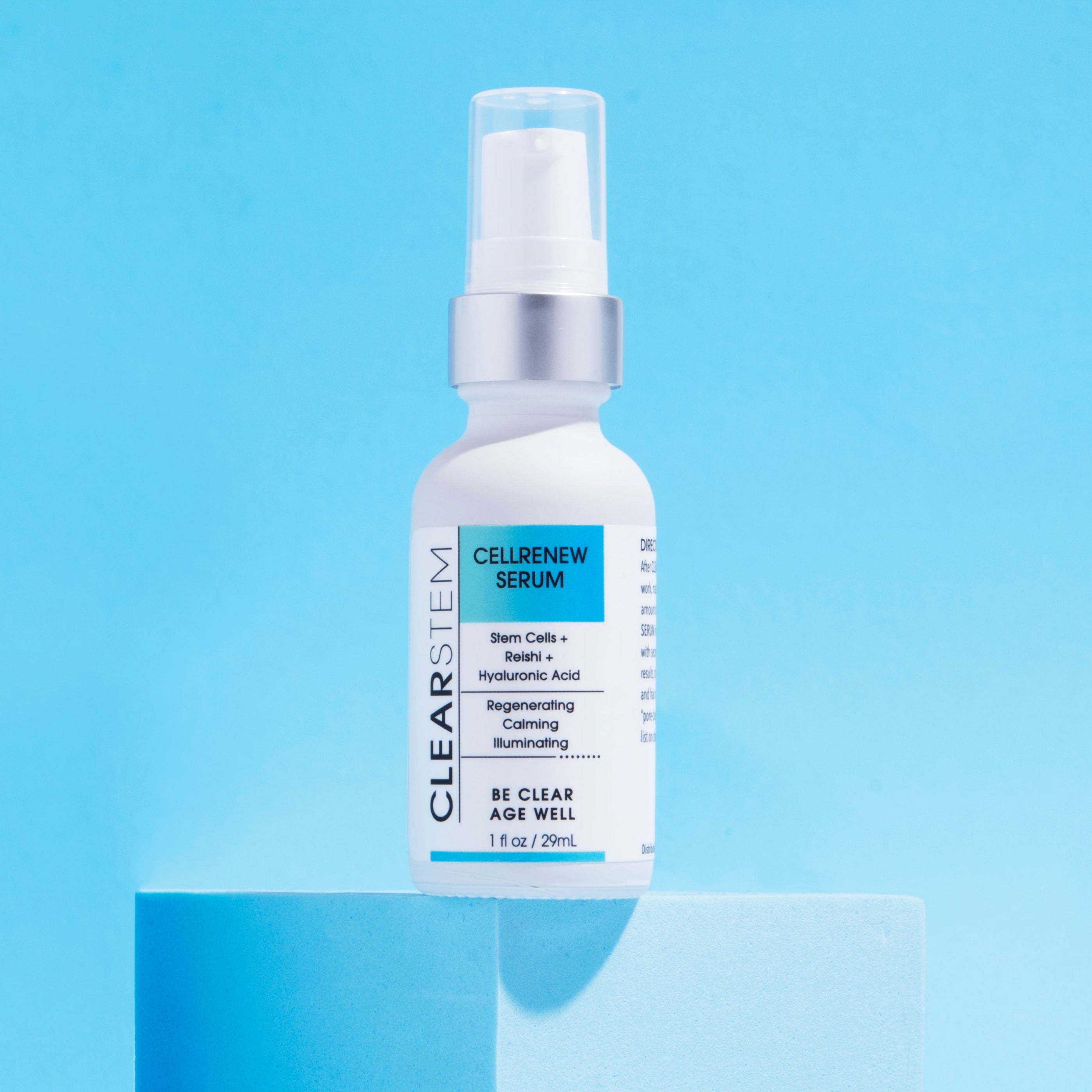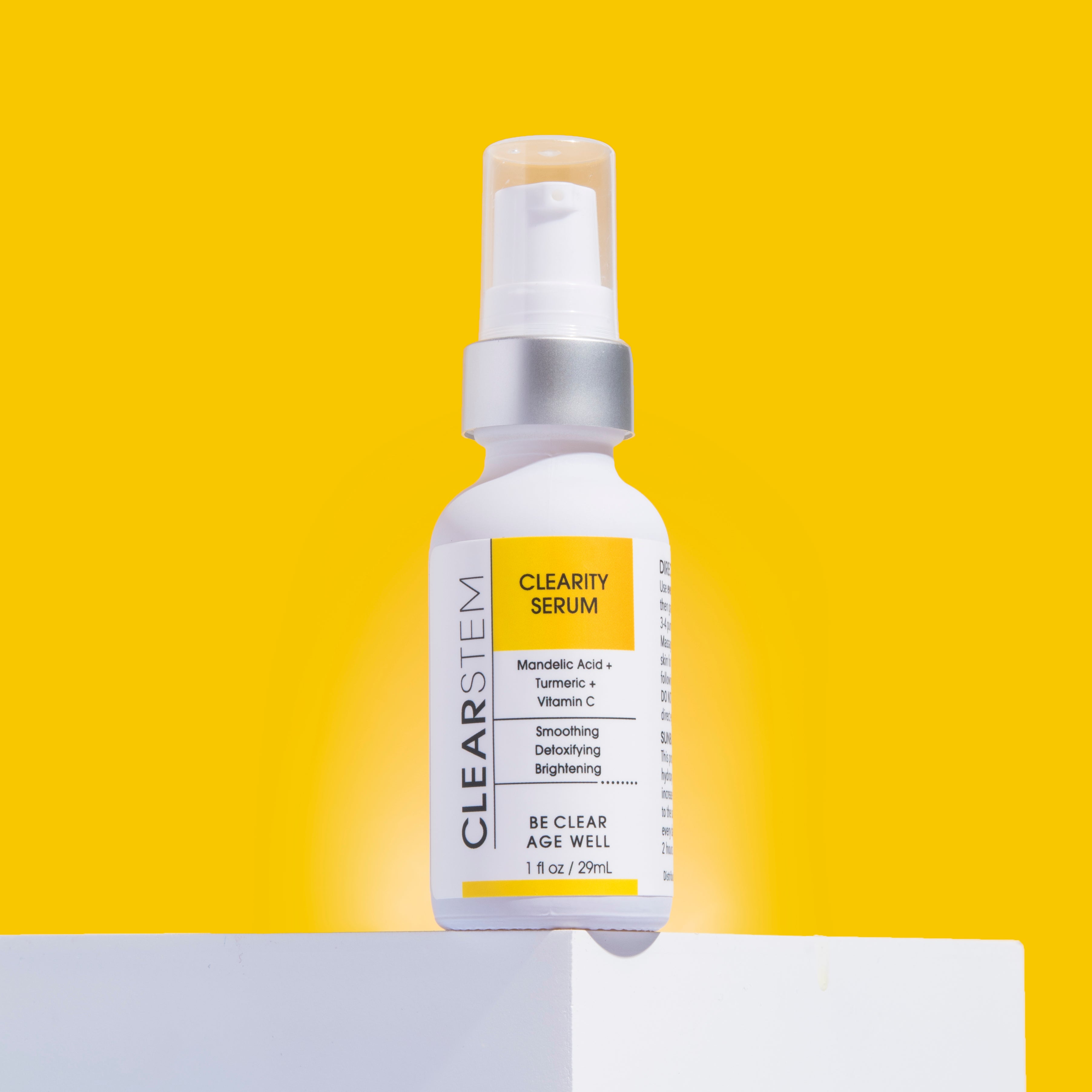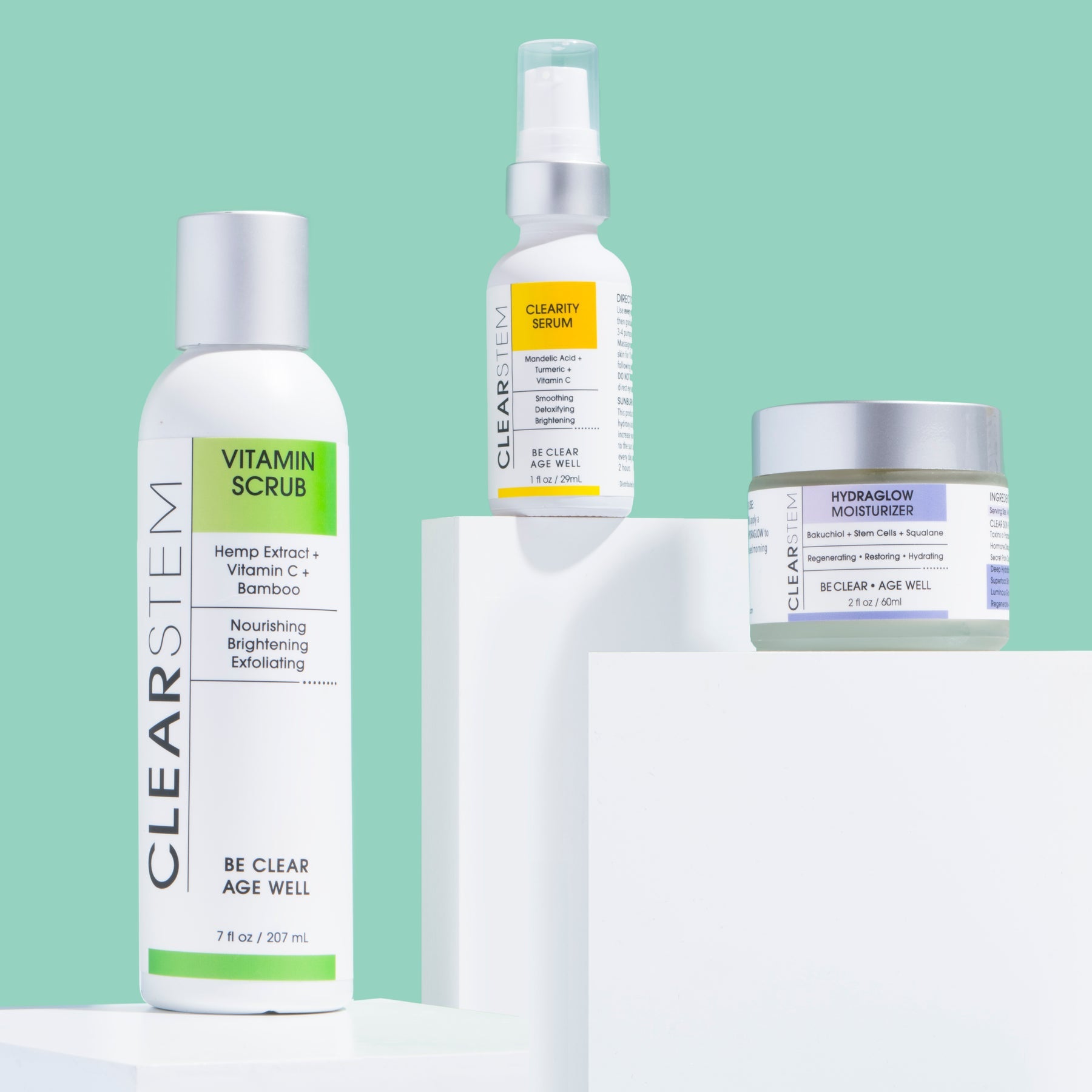Hormonal acne is a type of acne that is caused by fluctuations in hormones, such as testosterone and estrogen. It is most common in adolescents and women, and can be difficult to treat because it is often resistant to traditional acne treatments. If you are struggling with hormonal acne, you may be looking for natural alternatives and skincare for acne-prone skin to help.
Understanding this, CLEARSTEM offers solutions tailored to these unique challenges. Our CLEARSTEM Functional Lab Test, for instance, provides customized insights by analyzing markers in your blood related to stress, hydration, hormones, inflammation, and more. These markers not only indicate overall health but also highlight factors that can influence your skin. Through this, we can help pinpoint what might be triggering your hormonal acne and provide targeted recommendations.
Pairing this knowledge with our specialized skincare products ensures you're addressing the root cause, and not just the symptoms, giving you a clearer path toward radiant skin.
Can Vitamins & Supplements Help Hormonal Acne?
Dealing with hormonal acne can be a major bummer, especially if you feel like you’re doing everything else right to control your breakouts, but the blemishes keep on coming. Fortunately, there are many different types of vitamins and supplements that you can take to help treat your hormonal acne. Also, using non-comedogenic skincare products is a great way to minimize clogged pores as you’re battling acne.
Research has shown that taking certain types of supplements for hormonal acne – such as vitamin A (which is one of the best supplements for hormonal acne, as it’s a precursor to retinol), glutathione, vitamin B5 (we love taking vitamin B5 for acne!), and even turmeric – can send your breakouts packing. Even better, they are completely safe when taken correctly, which means that you can expect positive results, but without any unwanted side effects! (1)
Best Hormonal Acne-Fighting Supplements
If you’re wondering what the best supplements for hormonal acne are, look no further than these Accutane alternatives. We’ve rounded up the top 10 dermatologist-recommended supplements for hormonal acne to help you get the clear skin you deserve, and we also did all the research on all of their benefits for you, as well.
That way, you don’t have to worry about if they’ll actually work or not. Each and every one of these natural supplements for hormonal acne has been clinically proven to help combat acne breakouts, meaning you won’t waste your time on ineffective options.
1. Vitamin A for Hormonal Acne
One nutrient that may be helpful for the treatment of hormonal acne is vitamin A. Vitamin A is a nutrient that is essential for the proper functioning of the body. It is important for normal vision, the immune system, and reproduction, and is also necessary for the proper functioning of the heart, lungs, kidneys, and other organs. In terms of skin health, vitamin A can have a number of potential benefits.
One of the primary benefits of vitamin A for the skin is its ability to regulate the production of sebum, the oily substance produced by the skin's sebaceous glands. An excess of sebum on the skin can contribute to the development of acne, and by regulating sebum production, vitamin A may help to improve the overall health and appearance of the skin. Vitamin A can also help to reduce inflammation, which is a key factor in the development of acne.
There are several different forms of vitamin A, including retinoids, which are derived from animal sources, and carotenoids, which are derived from plant sources. Some common sources of vitamin A include sweet potatoes, carrots, spinach, and cantaloupe. Vitamin A can also be taken as a supplement in the form of pills or capsules.
2. Turmeric for Hormonal Acne
Another nutrient that may be helpful for the treatment of hormonal acne is turmeric. Turmeric is a spice that is commonly used in Indian and Middle Eastern cuisine. It is a member of the ginger family and is native to tropical regions of Asia. Turmeric is often used in traditional medicine for its anti-inflammatory and antioxidant properties. These properties make turmeric a popular natural treatment for a variety of skin conditions, including acne, eczema, and rosacea.
One of the primary active ingredients in turmeric is curcumin, a compound that has been shown to have potent anti-inflammatory and antioxidant properties. Inflammation is a key factor in the development of acne, and by reducing inflammation, turmeric can help to improve the overall health and appearance of the skin. Turmeric is also thought to have antibacterial properties, which can help to kill the bacteria that contribute to acne.
Turmeric can be taken orally as a supplement or applied topically to the skin. To use turmeric topically, you can mix it with water or a carrier oil, such as coconut oil, to create a paste. You can then apply the paste to your skin and leave it on for 10-15 minutes before rinsing it off. Turmeric can stain the skin, so be sure to use a gentle cleanser to remove any excess paste from your skin.
3. Dandelion for Hormonal Acne
Dandelion is a type of flowering plant that is native to Europe and Asia. It has been traditionally used as a natural remedy for a variety of ailments, including skin conditions. Dandelion is rich in vitamins and minerals, and is thought to have antioxidant and anti-inflammatory properties. It is also a natural diuretic, which means that it can help to flush toxins out of the body.
Some people believe that dandelion can help to improve the health and appearance of the skin by removing toxins from the body and reducing inflammation. Dandelion is also thought to have astringent properties, which means that it can help to tighten and tone the skin. Additionally, dandelion is rich in vitamins and minerals, including vitamin C, which is thought to be important for skin health.
Dandelion can be taken orally as a supplement or applied topically to the skin. To use dandelion topically, you can mix the dried herb with water or a carrier oil, such as coconut oil, to create a paste. You can then apply the paste to your skin and leave it on for 10-15 minutes before rinsing it off. Dandelion can also be found in some skin care products, such as toners and creams.
4. Digestive Enzymes for Hormonal Acne
Digestive enzymes are proteins that are produced by the body to help break down food into smaller molecules that can be absorbed and used by the body. They are important for proper digestion and the absorption of nutrients. There is some evidence to suggest that taking digestive enzymes as a supplement may help to improve the health and appearance of the skin.
Some people believe that digestive enzymes can help to improve the overall health of the digestive system, which may have a positive effect on the skin. Digestive enzymes are thought to help break down the nutrients in the food we eat, making it easier for the body to absorb them. By improving the absorption of nutrients, digestive enzymes may help to nourish the skin from the inside out.
There is limited research on the effectiveness of digestive enzymes for skin health, but some studies have shown that they may be helpful for certain skin conditions, such as eczema. Digestive enzymes can be taken as a supplement in the form of pills or capsules.
5. 5-HTP for Hormonal Acne
5-HTP (5-hydroxytryptophan) is a chemical compound that is involved in the production of serotonin, a neurotransmitter that is involved in mood and sleep. Some people take 5-HTP as a supplement to help with depression, anxiety, and sleep disorders. There is some evidence to suggest that 5-HTP may have skin-protective properties, but more research is needed to confirm this.
Some people believe that 5-HTP may help to improve mood and reduce stress, which can be contributing factors to the development of acne. Stress and hormonal changes can lead to an increase in the production of sebum, the oily substance produced by the skin's sebaceous glands that can contribute to the development of acne. By reducing stress and improving mood, 5-HTP may help to reduce the risk of acne. However, if you're seeking a natural supplement for hormonal acne that doesn't involve 5-HTP, consider MINDBODYSKIN® 2, specially designed for those taking SSRIs, antipsychotic medications, or other mood stabilizers to target oil, digestion, detoxification, PMS, and hormones simultaneously.
There is limited research on the effectiveness of 5-HTP for skin health, and more research is needed to confirm its potential benefits. 5-HTP can be taken as a supplement in the form of pills or capsules.
6. DIM for Hormonal Acne
DIM (diindolylmethane) is a compound that is found in certain vegetables, including broccoli, cabbage, and Brussels sprouts. It is thought to have antioxidant and anti-inflammatory properties, and some people take it as a supplement for a variety of health conditions. There is limited research on the effects of DIM on the skin, but it is thought to have potential benefits for acne and other skin conditions.
Some people believe that DIM may help to reduce inflammation and improve the overall health of the skin. Inflammation is a key factor in the development of acne, and by reducing inflammation, DIM may help to improve the appearance of the skin and reduce the risk of acne. DIM is also thought to have antioxidant properties, which means that it can help to protect the skin from damage caused by free radicals.
There is limited research on the effectiveness of DIM for skin health, and more research is needed to confirm its potential benefits. DIM can be taken as a supplement in the form of pills or capsules.
7. Vitamin B5 for Hormonal Acne
Vitamin B5, also known as pantothenic acid, is a nutrient that is important for the proper functioning of the body's cells. It is involved in the production of hormones and cholesterol, and is necessary for the synthesis of red blood cells. Some people take vitamin B5 as a supplement to help with acne and other skin conditions, although more research is needed to confirm its effectiveness.
Some people believe that vitamin B5 may help to reduce oil production and improve the overall health of the skin. Acne is often caused by an excess of oil on the skin, and by reducing oil production, vitamin B5 may help to improve the appearance of the skin and reduce the risk of acne. Vitamin B5 is also thought to have antioxidant properties, which means that it can help to protect the skin from damage caused by free radicals.
There is limited research on the effectiveness of vitamin B5 for skin health, and more research is needed to confirm its potential benefits. Vitamin B5 can be found in a variety of foods, including eggs, milk, meat, and whole grains, and can also be taken as a supplement in the form of pills or capsules.
8. Glutathione for Hormonal Acne
Glutathione is a compound that is produced by the body and is involved in a variety of important functions, including the detoxification of the body and the protection of cells from oxidative stress. Some people take glutathione as a supplement to help with a variety of health conditions, including skin conditions. However, there is limited research on the effectiveness of glutathione for skin health.
Some people believe that glutathione may help to reduce inflammation and improve the overall health of the skin. Inflammation is a key factor in the development of acne, and by reducing inflammation, glutathione may help to improve the appearance of the skin and reduce the risk of acne. Glutathione is also thought to have antioxidant properties, which means that it can help to protect the skin from damage caused by free radicals.
There is limited research on the effectiveness of glutathione for skin health, and more research is needed to confirm its potential benefits. Glutathione can be taken as a supplement in the form of pills or capsules.
You can find all of these key nutrients for healing hormonal acne in the CLEARSTEM MINDBODYSKIN hormonal acne supplement! You’ll want to get your hands on this ASAP.
9. Zinc for Hormonal Acne
Zinc is known for its anti-inflammatory properties and anti-bacterial nature, making it a great remedy for acne scars. Zinc has properties that help the skin reduce swelling and redness. Some argue that low amounts of zinc in your system could be the reason for hormonal acne. Yet, seeing results from topical application of zinc can take patience because it may take up to three months for visible results.
It’s important to have a good balance of the amount of zinc that’s applied to your skin or ingested because it could increase or decrease hormone levels depending on your body–zinc works as a hormone regulator so an excessive amount can create adverse results. ( 3 )
While zinc is great for hormonal acne, it is generally recommended to consult your dermatologist before use since it’s important to be considerate of the appropriate dosage and duration.
10.Vitamin E for Hormonal Acne
Vitamin E supplements can help to reduce hormonal acne because they act as antioxidants. Yet, topical treatment of vitamin e works best for visible results. While there’s limited research on the effects of vitamin e on hormonal acne, it can contribute to skin health and improve acne symptoms.
Known for its antioxidant activity, vitamin E can protect cells from damage caused by free radicals. Free radicals can promote inflammation and acne breakouts. Vitamin E has the power to neutralize free radicals, helping promote overall skin health. (4)
This vitamin also has scar healing properties, helping to get rid of scars from acne lesions or post-inflammatory hyperpigmentation. (5) While the effectiveness of vitamin E for hormonal acne can vary from person to person, it can be used as part of your skincare routine to support your skin health.
What Triggers Hormonal Acne?
When it comes to figuring out what triggers hormonal acne, it’s important to bear in mind that there’s not one specific thing that can set it off. But at the end of the day, it all boils down to a hormonal imbalance in your body. You see, when your male hormones (that is, androgens such as testosterone) outweigh your female hormones (namely, estrogen), it can lead to breakouts. Other hormonal imbalances such as excess estrogen, too little progesterone, and dysregulated cortisol can lead to breakouts in those who are acne-prone, as well. (6)
Some of the more common things that can lead to these changes and, in turn, hormonal acne include:
- Puberty
- Your menstrual cycle
- Pregnancy
- Menopause
- PCOS
- Viruses or toxicity in the body
Getting your hormones back into balance, therefore, is of utmost importance when it comes to managing your hormonal acne. By doing so, you can get back on track to having clear, smooth skin – regardless of whatever changes you’re undergoing in your life.
How to Know if Your Acne is Hormonal
Unlike other types of acne breakouts, there’s one huge dead giveaway about hormonal acne that will tell you if it is or isn’t hormonal. Take a good look in the mirror and take note of where your breakouts are occurring. If your blemishes are along your jawline and on your chin, then there’s a good chance that your breakout is of the hormonal variety. If they’re on your cheeks or forehead, then they may be caused by other triggers. (7)
Tips to Help Clear Hormonal Acne
If you have hormonal acne, it’s definitely understandable to want to get rid of it for good. Fortunately, there are a few things you can to do help address this skin issue. These include:
- Use topical treatments. Applying serums that contain ingredients like bakuchiol, vitamin C, and alpha hydroxy acid (AHA) can go a long way in clearing up your skin.
- Change your lifestyle. The things you eat, the amount of sleep you get at night, and even your stress levels can affect your complexion. (8) Your diet can seriously make a difference in regaining healthy skin–be considerate of what the nutritional makeup of the food you are ingesting.
- Audit your medicine cabinet. Certain vitamins can actually make your breakouts worse, such as biotin and B12, and even when taking vitamin D hormonal acne can be exacerbated.
- Address your underlying hormonal imbalance. Speak with an endocrinologist, or a holistic health practitioner to address the root cause of your hormonal imbalance.
- Consider prescription medications. A medical professional knows best because they're considerate of both your skin condition and health condition. If your acne doesn’t clear up even after taking an hormonal acne supplement, and you’re looking at potential scarring or severe acne, then a prescription from your dermatologist may be your best bet.
Remember, there’s no one-size-fits-all approach to clear skin, and what works for one person may not work as well for you. A bit of trial and error may be necessary, but once you find the right solution to your skincare woes, blemish-free skin will be right around the corner. (9)
Will My Hormonal Acne Ever Go Away?
When dealing with hormonal acne – or any type of acne, really – it can sometimes feel like you’re going to be stuck with this condition forever. The good news is that yes, hormonal acne can go away in time. However, you can’t just sit around and wait for it to go away on its own. Instead, you need to be proactive about not only treating it, but also getting to the root of the breakouts, too.
This means you may have to change up your lifestyle or skincare regimen, start taking some of the best vitamins and minerals for acne that we’ve recommended, or even speak to a dermatologist about it. Once you start treatment, you can start to expect results to show up within four to six weeks, though in some instances, it may take a bit longer. (10)
Don’t give up hope! Sure, it’s totally understandable to feel impatient, especially if it seems like your life is on hold while you wait for your breakouts to go away. But continue to live your best life, try to be compassionate with yourself, reach for some of the best supplements for hormonal acne, and hold the course. And before you know it, your current hormonal acne outbreak will be nothing more than a distant memory.
In conclusion, there are a number of nutrients that may have potential benefits for skin health, including vitamin A, turmeric, dandelion, digestive enzymes, 5-HTP, DIM, vitamin B5, and glutathione. While more research is needed to confirm the effectiveness of these nutrients for skin health, they may be worth considering as part of a healthy skincare routine. It is always important to speak with a healthcare professional before starting any new supplement regimen.
Supplements and Vitamins for Acne Top 10 Takeaways
- Vitamin A can help regulate sebum production and reduce inflammation, which may be beneficial for the treatment of acne.
- Turmeric has anti-inflammatory and antibacterial properties, which may be helpful for the treatment of acne and other skin conditions.
- Dandelion has antioxidant and anti-inflammatory properties and is a natural diuretic, which may be helpful for the treatment of acne and other skin conditions.
- Digestive enzymes may help to improve the overall health of the digestive system, which may have a positive effect on the skin.
- 5-HTP may help to improve mood and reduce stress, which can be contributing factors to the development of acne.
- DIM may help to reduce inflammation and improve the overall health of the skin, which may be beneficial for the treatment of acne.
- Vitamin B5 may help to reduce oil production and improve the overall health of the skin, which may be beneficial for the treatment of acne.
- Glutathione may help to reduce inflammation and improve the overall health of the skin, which may be beneficial for the treatment of acne.
- Zinc may help regulate hormonal imbalances in the body, reduce inflammation, and improve the overall health of the skin, which may be beneficial for preventing the development of acne.
- Vitamin E may help get rid of scarring and help improve the overall health of the skin, which may be beneficial for the treatment of acne.
Sources
Source 1: Vitamin A and Carotenoids https://ods.od.nih.gov/factsheets/VitaminA-HealthProfessional/
Source 2: Adult female acne: a guide to clinical practice https://www.ncbi.nlm.nih.gov/pmc/articles/PMC6360964/
Source 3: An Open-label Study Comparing Oral Zinc to Lymecycline in the Treatment of Acne Vulgaris
https://www.ncbi.nlm.nih.gov/pmc/articles/PMC8211333/
Source 4: Serum vitamin E levels and chronic inflammatory skin diseases: A systematic review and meta-analysis
https://pubmed.ncbi.nlm.nih.gov/34905558/
Source 5: Vitamin E in dermatology
https://www.ncbi.nlm.nih.gov/pmc/articles/PMC4976416/
Source 6: Hormonal treatment of acne vulgaris: an update https://www.ncbi.nlm.nih.gov/pmc/articles/PMC5015761/
Source 7: Epidemiology of Acne Vulgaris and Its Association With Lifestyle Among Adolescents and Young Adults in Hail, Kingdom of Saudi Arabia: A Community-Based Study https://www.ncbi.nlm.nih.gov/pmc/articles/PMC7431307/
Source 8: 9 Things To Try When Acne Won’t Clear https://www.aad.org/public/diseases/acne/diy/wont-clear

